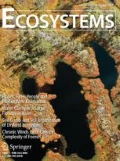Abstract
Building resilience in integrated human and nature systems or social–ecological systems (SES) is key for sustainability. Therefore, developing ways of assessing resilience is of practical as well as theoretical significance. We approached the issue by focusing on the local level and using five lagoon systems from various parts of the world for illustration. We used a framework based on four categories of factors for building resilience: (1) learning to live with change and uncertainty; (2) nurturing diversity for reorganization and renewal; (3) combining different kinds of knowledge; and (4) creating opportunity for self-organization. Under each category, the cases generated a number of items for building resilience, and potential surrogates of resilience, that is, variables through which the persistence of SES emerging through change can be assessed. The following factors were robust across all five lagoon SES cases: learning from crisis, responding to change, nurturing ecological memory, monitoring the environment, and building capacity for self-organization and conflict management.

Similar content being viewed by others
References
Allison EH, Ellis F. 2001. The livelihoods approach and management of small-scale fisheries. Mar Policy 25:377–88
Amarasinghe US, Amarasinghe MD, Nissanka C. 2002. Investigation of the Negombo estuary (Sri Lanka) brush park fishery, with an emphasis on community-based management. Fish Manage Ecol 9:41–56
Amarasinghe US, Chandrasekara WU, Kithsiri HMP. 1997. Traditional practices for resource sharing in an artisanal fishery of a Sri Lankan estuary. Asian Fish Sci 9:311–23
Berkes F. 1986. Local-level management and the commons problem: a comparative study of Turkish coastal fisheries. Mar Policy 10:215–29
Berkes F. 1992. Success and failure in marine coastal fisheries of Turkey. In: Bromley DW, Ed. Making the commons work. San Francisco: Institute for Contemporary Studies Press. p 161–82
Berkes F, Colding J, Folke C. 2000. Rediscovery of traditional ecological knowledge as adaptive management. Ecol Appl 10:1251–62
Berkes F, Folke C, Eds. 1998. Linking social and ecological systems: Management practices and social mechanisms for building resilience. Cambridge: Cambridge University Press
Campbell B, Sayer JA, Frost P, Vermeulen S, Ruiz Pérez M, Cunningham A, Prabhu R. 2001. Assessing the performance of natural resource systems. Conserv Ecol 5(2):22. [online] URL: http://www.consecol.org/vol5/iss2/art22
Carpenter SR, Westley F, Turner MG. 2005. Surrogates for resilience of social-ecological systems. Introduction to special feature of ecosystems. Ecosystems 8:xx-xx
Cash DW, Moser SC. 2000. Linking global and local scales: designing dynamic assessment and management processes. Glob Environ Change 10:109–20
Davidson-Hunt I, Berkes F. 2003. Learning as you journey: Anishinaabe perception of social-ecological environments and adaptive learning. Conserv Ecol 8(1):5. [online] URL: http://www.consecol.org/vol8/iss1/art5
Folke C, Carpenter S, Elmqvist T and others 2002. Resilience for sustainable development: Building adaptive capacity in a world of transformations. Paris: International Council for Scientific Unions (ICSU), Rainbow Series No. 3. [Online] URL: http://www.sou.gov.se/mvb/pdf/resiliens.pdf
Folke C, Colding J, Berkes F. 2003. Synthesis: building resilience and adaptive capacity in social-ecological systems. In: Berkes F, Colding J, Folke C, Eds. Navigating social-ecological systems: Building resilience for complexity and change. Cambridge: Cambridge University Press. p 352–87
Gunderson LH, Holling CS, Eds. 2001. Panarchy. Understanding transformations in human and natural systems. Washington DC: Island Press
Kalikoski DC, Satterfield T. 2004. On crafting a fisheries co-management arrangement in the estuary of Patos Lagoon (Brazil): opportunities and challenges faced through implementation. Mar Policy 28:503–522
Kalikoski DC, Vasconcellos M, Lavkulich L. 2002. Fitting institutions and ecosystems: the case of artisanal fisheries management in the Patos Lagoon. Mar Policy 26:179–96
Lobe K, Berkes F. 2004. The padu system of community-based fisheries management: change and local institutional innovation in south India. Mar Policy 28:271–81
Meadows DH. 1998. Indicators and information systems for sustainable development. Hartland (VT): Sustainability Institute
Perrings CA, Mäler K-G, Folke C, Jansson BO, Holling CS, Eds. 1995. Biodiversity conservation. Dordrecht: Kluwer
Reis EG, D’Incao F. 2000. The present status of artisanal fisheries of extreme Southern Brazil: an effort towards community-based management. Ocean Coast Manage 43:585–95
Seixas CS, Berkes F. 2003. Dynamics of social-ecological changes in a lagoon fishery in Southern Brazil. In: Berkes F, Colding J, Folke C, Eds. Navigating social-ecological systems: building resilience for complexity and change. Cambridge: Cambridge University Press. p 271–98
Walker B, Carpenter S, Anderies J, Abel N, Cumming G, Janssen M, Lebel L, Norberg J, Peterson G, Pritchard R. 2002. Resilience management in social-ecological systems: a working hypothesis for a participatory approach. Conserv Ecol 6(1):14. [Online] URL: www.consecol.org/vol6/iss1/art14
Young O. 2002. The institutional dimensions of environmental change. Fit, interplay and scale. Cambridge (MA): MIT Press
Acknowledgements
We thank members of the Resilience Alliance and the surrogates group for the stimulation; Upali Amarasinghe, Daniela Kalikoski and Kenton Lobe for lagoon management insights and suggestions for the paper; and Steve Carpenter and two anonymous referees for comments. The research was supported by the SSHRC and CRC for Berkes and the CNPq-Brazil for Seixas (Process: 200263/97-8).
Author information
Authors and Affiliations
Corresponding author
Rights and permissions
About this article
Cite this article
Berkes, F., Seixas, C.S. Building Resilience in Lagoon Social–Ecological Systems: A Local-level Perspective. Ecosystems 8, 967–974 (2005). https://doi.org/10.1007/s10021-005-0140-4
Received:
Accepted:
Published:
Issue Date:
DOI: https://doi.org/10.1007/s10021-005-0140-4




